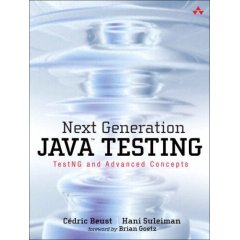anton maximov

JUnit Joys
i have been wrestling with some legacy code recently. beating it over the head with a copy of Working Effectively with Legacy Code did not do much, so i started writing tests to see how it worked.

after a few minutes of waiting for eclipse + junit4.3.11 combo to load, i furiously coded a bunch of tests, and then realized that i could not make them fail. essentially it boiled down to the following:
assertEquals(1.0, 1.1);
…which quietly and happily passes. wtf?!! these are two doubles, just compare them and let’s move on with our lives!
then after a bit of thinking i recalled that most of my tests that involved doubles were written on projects that were still on jdk < 1.5, when method above simply won’t even compile, alerting me to the fact that junit expects assertEquals(double, double, delta), where delta is the precision you need.
why they couldn’t simplify my life by creating a couple of Double
instances and calling equals() on them is beyond me. this is what i
would want most of the time anyway.
since i was running tests under jdk1.5, autoboxing kicked in and now we
have two Doubles on our hands. fine, this should not be a big deal,
simply call double1.equals(double2) and be done with it – what’s a big
deal?
but nooooooooo, check out this little bundle of joy:
private static boolean isEquals(Object expected, Object actual) {
if (expected instanceof Number && actual instanceof Number)
return ((Number) expected).longValue() == ((Number) actual).longValue();
return expected.equals(actual);
}
what the hell?!! you correctly detect that this instance of Double is
an instance of Numeric, then take its long value and throw fractional
part out. quietly. so all my tests never even squeak. why?!!!
an obvious approach is to suck it up and appease the api:
assertEquals(1.0, 1.1, 0);
this will work. but damn! my eyes!!
TestNG
we all know that junit is legacy, and version 4 was an afterthought, so
let’s see what testng does. the
api
is the same, and under jdk1.5 my primitives get autoboxed into Doubles
and assertEquals(Object, Object) gets called:
public static void assertEquals(Object actual, Object expected, String message) {
if (expected == null && actual == null)
return;
if (expected != null && expected.equals(actual)) {
return;
} else {
failNotEquals(actual, expected, message);
return;
}
}
voila! this is exactly what i expected. and guess what – it actually works and correctly fails the original test.

Lessons
- man, this alone would scare me away from junit in favor of testng
- make sure your test fails before it ever works!
- what really frightens me is how many more of these quiet autoboxing errors are lurking out there. what previously would be caught by the compiler now silently works in unpredictable ways
- yet another thing to be aware of when upgrading your app from jdk1.[34] to jdk1.5+
Note
this junit bug has been fixed in junit4.4 and up
Ruby
interestingly enough, on a few skunk works projects this year i cobbled together a bunch of existing libraries with ruby glue and used (j)ruby’s Test::Unit (which conveniently comes with ruby distro) and rspec for testing the result.
it definitely makes sense for a project that is written in (j)ruby that uses many existing java libraries; it might be a bit of a mindset shift for a java project that is looking for simplified testing. for now i am keeping an eye on projects like JtestR
-
default version of junit that ships with eclipse 3.3 ↩